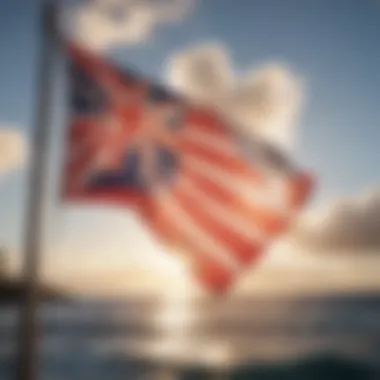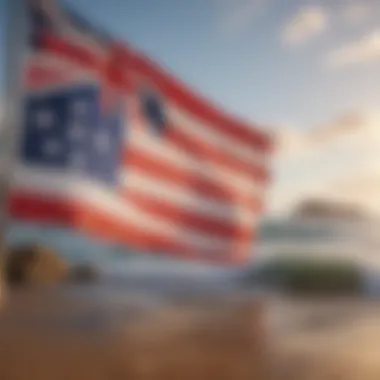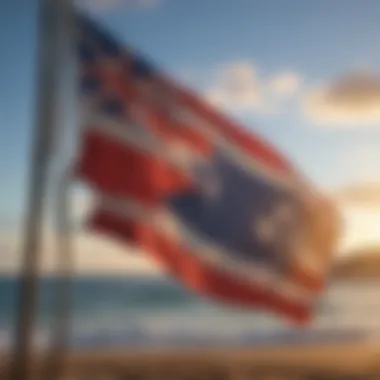Unearthing the Intriguing History and Symbolism of Hawaiian Flags


Water Activity Overview
Carve through the azure waves of the Pacific Ocean with the exhilarating water activities that await in Hawaii. From the adrenaline-fueled excitement of surfing to the serene exploration while snorkeling, Hawaiian waters offer a playground for enthusiasts of all levels. Whether you seek the thrill of riding powerful waves or the tranquility of gliding atop crystal-clear waters, the diverse water sports options in Hawaii cater to every taste.
Tips and Techniques
Delve into the world of Hawaiian water sports armed with essential tips to kickstart your adventure. For beginners eager to ride their first wave, focus on mastering basic surfing stances and paddling techniques. Advanced enthusiasts can refine their skills by experimenting with trickier maneuvers and wave-reading strategies. Safety is paramount, so always adhere to local guidelines, be mindful of changing tides, and wear suitable protective gear to ensure a secure and enjoyable experience.
Gear Reviews
Equip yourself with the best tools for navigating the Hawaiian waters. Surfboards designed for varying skill levels, from stable beginner boards to high-performance shortboards, are essential for catching waves with style. Sailboats offer a unique seafaring experience, enabling sailors to harness the wind's power for exhilarating voyages. High-quality snorkeling equipment ensures clear underwater visibility, allowing you to marvel at Hawaii's vibrant marine life. Paddleboards provide a versatile option for exploring tranquil lagoons or challenging surf breaks, while durable wetsuits maintain comfort and warmth in the island's temperate waters.
Destination Guides
Embark on a journey to Hawaii's top water sports destinations, each offering a distinctive aquatic experience. Discover popular spots like Waikiki Beach, known for its world-class surfing conditions and energetic beachfront vibe. Venture off the beaten path to find hidden gems where you can indulge in secluded snorkeling coves or serene paddleboarding paths. Prepare for your trip with essential travel tips, such as the best time to visit for optimal water conditions, local regulations to respect, and recommendations for immersive water sports excursions.
Introduction to Hawaiian Flags
Hawaiian flags carry a rich tapestry of history and cultural symbolism deeply ingrained in the islands' heritage and identity. The significance of delving into the world of Hawaiian flags lies in unraveling the intricate layers of their origins, design elements, and evolution over time. This exploration allows us to comprehend not only the visual representation but also the deeper meanings embedded within the flags, reflecting the societal shifts and historical milestones of Hawaii. Through peering into the past and understanding the present context, we unearth a comprehensive narrative that sheds light on the significance of Hawaiian vexillology in the broader realm of cultural studies.
Origins of Hawaiian Vexillology
Early influences on Hawaiian flag design
The early influences on Hawaiian flag design spark a profound exploration of the cultural interactions that shaped the visual language of Hawaii's flags. By examining the fusion of indigenous Hawaiian symbols with external influences such as European heraldry and American flag traditions, we uncover a mosaic of influences that contributed to the unique aesthetics of Hawaiian flags. This fusion of cultural elements not only reflects a convergence of histories but also symbolizes the complex identity of Hawaii's people through a visual medium that continues to evolve.
Random Paragraph : This can be extended further, integrating examples of specific flags or design elements that showcase the nuanced amalgamation of cultural symbols. The interplay of colors, patterns, and symbols in early Hawaiian flags serves as a window to the past, offering insights into the socio-political landscape and the values emblematic of different eras in Hawaiian history. By scrutinizing these design choices, we gain a deeper appreciation for the intricate tapestry of influences that have shaped Hawaiian vexillology.


Random Paragraph 2 : Additionally, the dynamic nature of early Hawaiian flag design presents a roadmap of historical transitions and power shifts, where symbols were not merely decorative but wielded profound political and cultural significance. By dissecting these design elements, we unveil the layers of meaning encoded within the flags, making visible the narratives of conquest, alliance, and identity assertion that defined Hawaii's complex history.
Symbolism in the first Hawaiian flag
The symbolism embedded in the first Hawaiian flag serves as a cornerstone of Hawaiian vexillology, encapsulating the aspirations and ideals of a kingdom navigating a changing world. Each element of the flag, from the arrangement of colors to the selection of symbols, carries a narrative steeped in cultural significance and political nuance. Understanding the symbolism in the first Hawaiian flag unveils not only a visual representation but also a manifesto of sovereignty and identity for the Hawaiian people.
Random Paragraph : Throguh critical analysis and historical context, we decipher the layers of meaning behind each symbol adorning the first Hawaiian flag. This exploration reveals a complex web of narratives, where colors represent landscapes, symbols embody ancestral knowledge, and patterns signify alliances. By unraveling these symbolic threads, we gain a glimpse into the worldview and values of Hawaii's early leaders, offering a window into the challenges and aspirations of a kingdom on the brink of transformation.
Random Paragraph 10 : Moreover, the symbolism in the first Hawaiian flag transcends mere aesthetics, serving as a visual language that communicates resilience, tradition, and a yearning for autonomy in the face of external pressures. Each motif is a chapter in Hawaii's history, narrating tales of adaptation, resistance, and resilience that continue to resonate in contemporary Hawaiian consciousness. By decoding these symbols, we decode not just a flag but a living chronicle of a people's journey through time.
Design Elements and Symbolism
In this meticulous article, we delve deep into the complex world of Hawaiian vexillology, focusing primarily on the design elements and symbolism that define the essence of Hawaiian flags. The intricate interplay between colors, motifs, and historical context unveils a rich tapestry of cultural significance. Understanding the design elements and symbolism is crucial to unravel the captivating stories each flag carries.
Color Palette of Hawaiian Flags
The color palette of Hawaiian flags, predominantly consisting of red, white, and blue, holds profound symbolic meanings deeply rooted in the history and culture of Hawaii. The vibrant hues reflect themes of passion, purity, and loyalty, weaving a narrative that transcends time. From the fiery red symbolizing courage to the pristine white embodying peace, each color tells a vibrant tale of the island's journey.
Meaning behind red, white, and blue
Exploring the meaning behind the striking colors of Hawaiian flags reveals a symphony of emotions and values. Red symbolizes the blood shed for freedom and unity, while white signifies the pure intentions and peace sought by the Hawaiian people. Blue, representing the vast Pacific Ocean, reminds us of the island nation's deep connection to the sea. Together, these colors form a harmonious blend that encapsulates the essence of Hawaiian heritage.
ImGui Symbolic interpretation of color combinations -miss[/mistake-]
- discusses the significance of color combinations in Hawaiian flags on the overall portrayal of the island nation's identity. The precise amalgamation of red, white, and blue heralds themes of resilience, harmony, and strength, encapsulating the spirit of Hawaii within each flag. The captivating blend of colors evokes a sense of tradition and modernity, entwined in a visual symphony that resonates with cultural pride and resilience.
Emblematic Motifs in Hawaiian Flags


Within the intricate tapestry of Hawaiian flags lie emblematic motifs that serve as poignant reflections of the island's heritage and values. The presence of royal symbols and depictions of traditional Hawaiian imagery embellish each flag with layers of historical context and cultural significance.
Presence of royal symbols
Royal symbols embedded within Hawaiian flags evoke a sense of regality and authority, honoring the lineage of Hawaiian monarchs and their enduring legacies. These symbols not only convey a sense of respect for the past rulers but also serve as a reminder of the kingdom's dynastic heritage, offering insight into Hawaii's rich and storied past.
Depictions of traditional Hawaiian imagery
The inclusion of traditional Hawaiian imagery, such as kapa patterns and kīhei symbols, enlivens the flags with elements of indigenous artistry and cultural identity. These depictions pay homage to the island's unique cultural heritage, celebrating ancestral traditions and customs that have shaped Hawaiian society for generations.
Influence of Polynesian Navigation
Polynesian navigation, with its intricate knowledge of the stars and ocean currents, has significantly influenced the design of Hawaiian flags, infusing them with a sense of seafaring prowess and cultural heritage. The incorporation of navigation tools as design inspirations and the reflection of cultural heritage in flag motifs underscore the deep connection between the Hawaiian people and the ocean that surrounds them, transcending mere symbolism to embody a way of life that celebrates exploration and discovery. -Calent mentioning the intricacies of Polynesian navigation elevates the significance of flag design, connecting the past with the present in a seamless tapestry of cultural continuity and maritime prowess.- misundering the evolution of Hawaiian flags through the lens of Polynesian navigation adds a layer of depth and meaning to the colorful banners that flutter in the island breeze.
Notable Hawaiian Flags
In exploring the history and meaning behind Hawaiian flags, the section on Notable Hawaiian Flags serves as a pivotal point of interest. This segment delves into the significance of distinguished flags within the context of Hawaiian cultural heritage. Notable Hawaiian Flags encapsulate centuries of historical evolution and embody the essence of Hawaiian identity through their unique design elements and symbolism. By focusing on specific elements like intricate patterns, color schemes, and emblematic motifs, this section highlights the exceptional craftsmanship and cultural narratives embedded in these iconic flags.
Kamehameha 's Royal Standard
Meaning behind distinctive design elements
Taking a closer look at Kamehameha I's Royal Standard unveils a mesmerizing fusion of symbols and artistic flair. The meticulous arrangement of motifs and colors carries profound meanings that reflect Kamehameha I's reign and the spirit of Hawaiian royalty. This distinctive design element not only captures historical legacies but also symbolizes power, unity, and sacred traditions. Its incorporation in this article enriches the narrative by showcasing the legacy of Hawaiian monarchy and its enduring influence on flag symbolism.
Historical context of royal usage
Embedded within the historical context of royal usage lies a tapestry of significance that illuminates the grandeur of Kamehameha I's Royal Standard. The flag's historical journey, from ceremonial events to royal proclamations, underscores its role as a symbol of authority and honor. Its portrayal in this article accentuates the deep-rooted connection between Hawaiian monarchs and their emblematic representations, offering readers a compelling insight into the regal history that continues to resonate in contemporary Hawaiian culture.


Hawaii State Flag
Evolution from territorial flag to state flag
The evolution of the Hawaii State Flag signifies a transformative journey marked by political shifts and cultural metamorphosis. Tracking its progression from a territorial symbol to a state emblem unveils a narrative of resilience and adaptation in the face of changing times. This transition not only reflects Hawaii's historical transitions but also symbolizes its steadfast commitment to preserving its cultural heritage amidst modernization. Its inclusion in this article underscores the flag's symbolic evolution and its enduring relevance in encapsulating Hawaii's statehood identity.
Symbolism of statehood in flag representation
At the heart of the Hawaii State Flag lies a profound symbolism that encapsulates the essence of statehood and Hawaiian sovereignty. Each element woven into the flag's design, from the Union Jack to the eight stripes representing the main islands, symbolizes Hawaii's historical path to statehood. This symbolic representation serves as a reminder of Hawaii's unique political narrative and its journey towards self-governance and cultural preservation. Highlighting this symbolism within the article illuminates the flag's multifaceted layers of meaning and enriches the reader's understanding of Hawaii's complex historical landscape.
Historical Importance of Flags in Hawaiian Culture
Role of flags in unifying Hawaiian kingdoms
The role of flags in unifying Hawaiian kingdoms transcends mere visual symbols; it signifies a deeper sense of cultural cohesion and pride. Flags served as unifying emblems that rallied diverse communities under a shared identity, fostering a sense of solidarity amidst varying tribal affiliations. By exploring this historical narrative, readers gain insight into the pivotal role of flags as cultural unifiers and guardians of Hawaiian heritage. This exploration sheds light on the intricate dynamics of Hawaiian society and the enduring legacy of flags as agents of unity and cultural significance.
Legacy of ancient flag traditions
The legacy of ancient flag traditions echoes throughout Hawaiian history, resonating with stories of honor, courage, and reverence for ancestral wisdom. These traditions, woven into the fabric of Hawaiian culture, carry forward the spirits of past generations and uphold the sacred customs that define Hawaiian identity. By delving into this rich legacy, the article pays homage to the timeless traditions that continue to inspire contemporary flag design and honor the resilient spirit of the Hawaiian people. This section celebrates the enduring legacy of ancient flag traditions, underscoring their profound impact on Hawaiian culture and identity.
Modern Interpretations and Contemporary Relevance
Despite being manifestations of a bygone era, Hawaiian flags retain enduring significance by adapting to modern interpretations. Their contemporary relevance lies in serving as potent symbols that bridge the historical narrative with the present cultural identity. In the context of this article, the exploration of Modern Interpretations and Contemporary Relevance sheds light on the adaptive nature of Hawaiian vexillology, emphasizing how these flags continue to echo their past while resonating with the current ethos. Engaging with this theme offers a nuanced perspective on how tradition interacts with contemporary reinterpretations. ### sage of Hawaiian Flags Today ### C al events and festivals: In the vibrant tapestry of Hawaiian culture, flags play a pivotal role in cultural events and festivals. The fluttering banners not only enhance the visual spectacle but also serve as emblematic representations of heritage and pride. Their presence adds a layer of tradition and symbolism to festivities, enriching the experience for participants and onlookers alike. The unique synergy between Hawaiian flags and cultural events creates a dynamic narrative that intertwines past and present, enriching the cultural landscape. Commercial and artistic adaptations: Commercial and artistic adaptations of Hawaiian flags contribute to showcasing the fusion of tradition with modern aesthetics. Through commercial ventures and artistic endeavors, these flags transcend their historical context to become versatile symbols of creativity and identity. Their adaptability allows them to be assimilated into various forms of contemporary art and consumer products, extending their reach beyond traditional realms. This hybridization of commerce and artistry injects new life into the historical motifs, making them relevant in diverse spheres. ### Educ al Initiatives on Hawaiian Vexillology ### Promoting eness of flag history: Educating about flag history is pivotal in preserving the rich heritage encapsulated in Hawaiian flags. By promoting awareness of their historical significance, educational initiatives facilitate a deeper appreciation and understanding of these cultural artifacts. This knowledge not only conserves the legacy of Hawaiian vexillology but also cultivates a sense of cultural consciousness among learners, ensuring the endurance of these symbols for future generations. Incorporating flag studies in academic curriculum: The integration of flag studies into academic curricula serves as a distinctive method to impart cultural knowledge and instill a sense of identity among students. By weaving flag studies into educational frameworks, students gain insights into the historical, societal, and artistic dimensions of Hawaiian flags. This interdisciplinary approach not only broadens students' perspectives but also fosters a holistic understanding of the cultural tapestry they are part of. ### Future Trend Hawaiian Flag Design ### Innovations in fl eation: The realm of flag design in Hawaii is witnessing a paradigm shift with innovative approaches redefining traditional norms. Innovations in flag creation entail experimentation with new motifs, colors, and design elements, infusing a contemporary flair into the timeless art of vexillology. This evolution in flag design reflects a dynamic cultural landscape that embraces change while honoring its historical roots. Emerging themes and motifs: The emergence of new themes and motifs in Hawaiian flag design signals an evolution towards more diverse and inclusive representations. By embracing emerging motifs, flag designers can capture the essence of modern Hawaii, incorporating elements that resonate with the current societal ethos. This diversification in themes enriches the visual language of Hawaiian flags, ensuring their relevance in an ever-changing world.
Conclusion
Reflection on Hawaiian Flag Legacy
Enduring significance of Hawaiian flag heritage
The Enduring significance of Hawaiian flag heritage encapsulates the essence of timelessness within the realm of vexillology. This specific aspect of Hawaiian flags resonates with the enduring spirit of the Hawaiian people, encapsulating their struggles, triumphs, and cultural resilience across generations. Its significance lies in the seamless blend of tradition and modernity, where each flag tells a unique story of Hawaii's past while shaping its present and future. Embracing this heritage in the context of this article enriches the discourse, offering readers a glimpse into the deep well of history that nourishes Hawaiian identity.
Impact on contemporary Hawaiian cultural identity
The Impact on contemporary Hawaiian cultural identity stands as a testament to the adaptability and dynamism of Hawaiian flags in a modern context. This aspect explores how these flags continue to not only symbolize the rich heritage of Hawaii but also play a pivotal role in shaping the collective consciousness of its people today. By reflecting on and incorporating traditional elements into contemporary settings, Hawaiian flags contribute to maintaining a sense of cultural continuity and pride. Their impact on the modern Hawaiian cultural landscape reinforces the notion that history is not static but rather a living, breathing entity that evolves with each passing moment.















